Lizard Behavior and Life History - Male Displays and Combat


| Bright Male Colors | |||
Males of some species of lizards have bright coloring on either their throats, their sides, their bellies, or all three. Some even have a pattern on the rest of their body that differs from the female pattern. These colors are used to communicate with other lizards. They show off these colors to drive off rival males and to attract females. These colors often intensify during the breeding season. The bright colors show females that a male is healthy. Unhealthy males full of internal parasites and harmful viruses and bacteria, tend to be duller in color. "...the colors we see on lizards are only a fraction of what is actually there. Our human eyes can see certain wavelengths of light, from the short wavelengths that we see as purple to the long wavelengths that represent red. Diurnal lizards are capable of seeing those colors, but they can also detect even shorter wavelengths that reflect ultraviolet light, such that what might look to us like a plain white chin on a male lizard actually appears to them as a blazing ultraviolet signal they use to 'talk' to one another." (Taylor, Emily. California Lizards and How to Find Them. Heyday, Berkeley, California. 2025.) |
|||
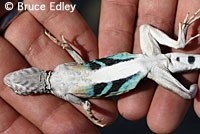 |
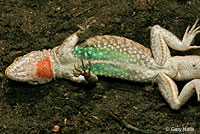 |
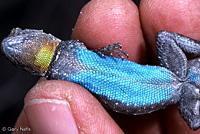 |
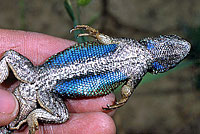 |
| Adult male Western Zebra-tailed Lizard © Bruce Edley |
Adult male Long-tailed Brush Lizard | Adult male Small-scaled Lizard | Adult male Coast Range Fence Lizard |
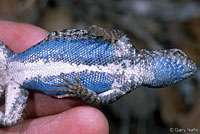 |
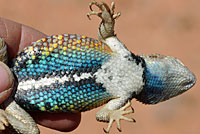 |
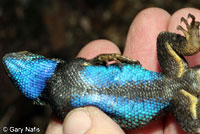 |
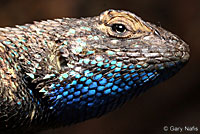 |
| Adult male Western Sagebrush Lizard | Adult male Desert Spiny Lizard | Adult male Great Basin Fence Lizard | |
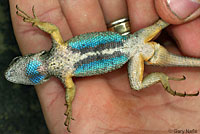 |
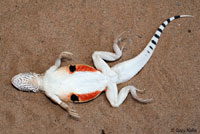 |
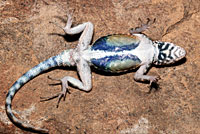 |
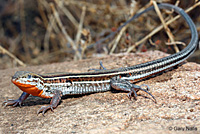 |
| Adult male Northwestern Fence Lizard | Adult male Colorado Desert Fringe-toed Lizard |
Adult male Big Bend Canyon Lizard |
Adult male Belding's Orange-throated Whiptail |
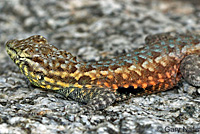 |
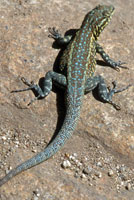 |
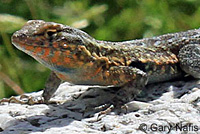 |
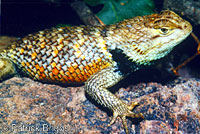 |
| Adult male Western Side-blotched Lizards |
Adult male Yellow-backed Spiny Lizard © Patrick Briggs |
||
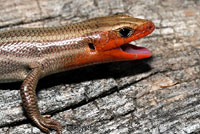 |
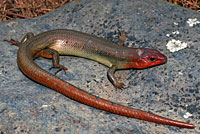 |
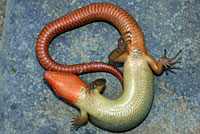 |
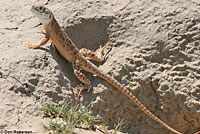 |
| Breeding adult male Common Five-lined Skink. |
Breeding male Northern Brown Skink. | Male Blunt-nosed Leopard Lizard during the breeding season © Don Roberson |
|
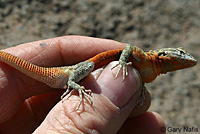 |
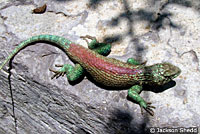 |
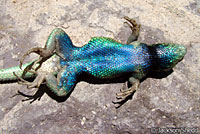 |
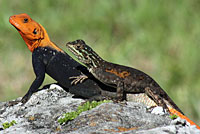 |
| Adult male Nevada Side-blotched Lizard showing his breeding coloring. |
Adult Male Hunsaker's Spiny Lizard © Jackson Shedd |
Adult male Peter's Rock Agama, on left, with adult female on right. | |
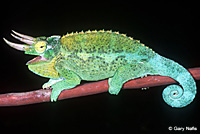 |
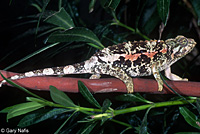 |
 |
 |
| Male Jackson's Chameleon on left, female on right. | Adult male Northwestern Skink with breeding colors. © Alan Barron | ||
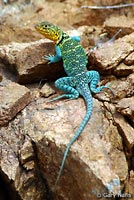 |
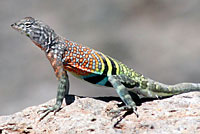 |
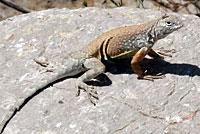 |
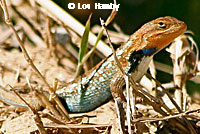 |
| Adult male Eastern Collared Lizard | Adult male Chihuahuan Greater Earless Lizard |
Breeding adult male Texas Greater Earless Lizard |
Breeding adult male Prairie Lizard © Lou Hamby |
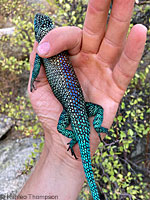 |
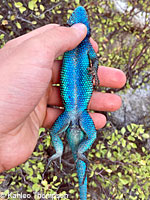 |
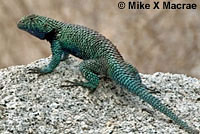 |
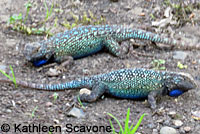 |
| Brightly-colored adult male Granite Spiny Lizard © Kahleo Thompson | Adult male Granite Spiny Lizard © Mike X Macrae |
The turquoise body coloring of male Western Fence Lizards intensifies when they are displaying themselves to other males during combat. Lake County. © Kathleen Scavone |
|
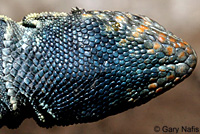 |
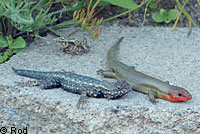 |
||
| Adult male Nevada Side-blotched Lizard |
Adult male lizards, especially during the Spring breeding season, do not tolerate other males in their territory, but that apparently does not apply to males of other species, as this adult male Northwestern Fence Lizard and adult male Greater Brown Skink were photographed basking together in Placer County in late April © Rod |
||
| Territorial Displays | |||
Many male lizards stand up high on their legs and arch their back to show their territorial dominance to other lizards or to anyone who comes near them. Then they often raise and lower their body as if they are doing push-ups. This display shows off the bright coloring on their throats and sides, if they have it, and shows that they are in prime physical condition, and not to be messed with. Females also do push-ups. |
|||
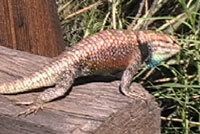 |
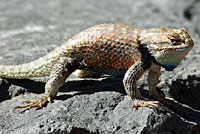 |
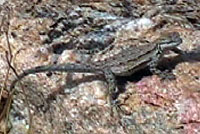 |
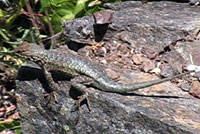 |
| This short video shows some Northern Desert Spiny Lizards in territorial poses and doing push-up displays. | An adult male Northern Desert Spiny Lizard territorial display. | Short Video: I was very close to this female Baja California Brush Lizard for about fifteen minutes while she basked on a rock. She tolerated my movements around the rock to photograph her. Then she moved away from me to a smaller rock and did a a push-up display. After that, she moved again and displayed again. I don't think the displays were for my benefit. They may have been aimed at other lizards nearby that I did not see. |
This short video shows a male Western Sagebrush Lizard in Contra Costa County running between rocks, then stopping to do a push-up display. |
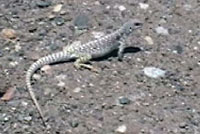 |
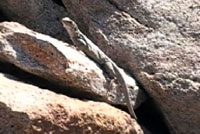 |
 |
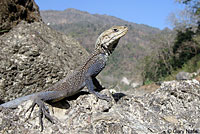 |
| Short Video: A Northern Desert Iguana darts around and does a short territorial push-up display for my benefit. |
Short Video: A Common Chuckwalla emerges from its crevice and does a territorial push-up display. Even lizards hate paparazzi.... |
A beautiful adult male Chihuahuan Greater Earless Lizard shows off his bright colors. | An adult male Kashmiri Rock Agama demonstrates who is the king of his beach on the banks of the Ganges. |
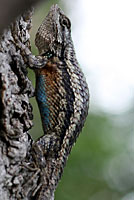 |
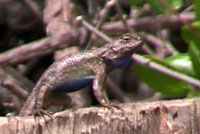 |
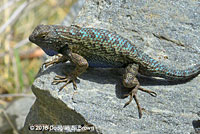 |
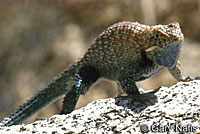 |
| An adult male Texas Spiny Lizard displays his awesomeness on a tree. | In this video, a male Northwestern Fence Lizard defecates off the side of a Butte County fence, wipes himself off, then does a territorial push-up display. Whether it was aimed at me or not, I got the message... |
Adult male Great Basin Fence Lizard defensive display, Los Angeles County. © Douglas S. Brown | Adult male Granite Spiny Lizard territorial display |
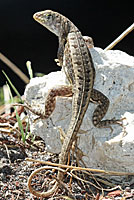 |
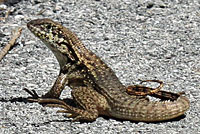 |
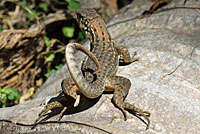 |
|
| Curly-tail lizards curl the end of their tail up, often holding it over their back, and wave it back and forth when they are excited. The curl is a territorial signal from males and also serves to attract females. Lizards with broken and re-grown tails don't seem to be able to do this as well. They are not native to the United states, but two species have been introduced into Florida. The one on the left is a juvenile Red-sided Curlytail Lizard and the two on the right are Northern Curlytail Lizards. The Red-sided Curlytail Lizard doesn't curl its tail as tightly as the Northern Curlytail Lizard. |
|||
| Territorial Dewlap Displays | |||
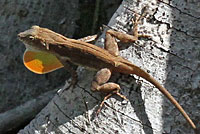 |
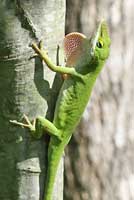 |
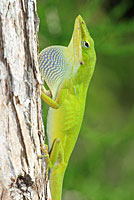 |
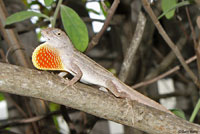 |
| Puerto Rican Crested Anole | Northern Green Anole | Southern Green Anole | Cuban Brown Anole |
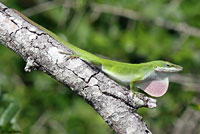 |
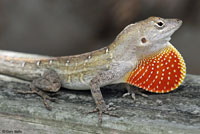 |
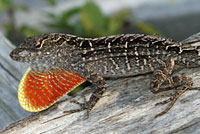 |
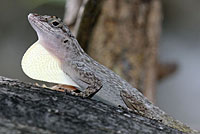 |
| Northern Green Anole | Cuban Brown Anole | Cuban Brown Anole | Bark Anole |
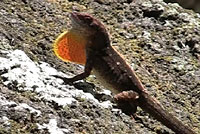 |
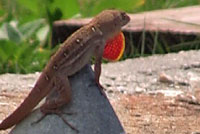 |
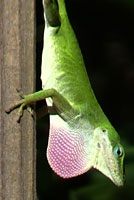 |
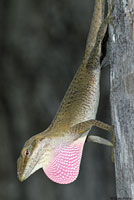 |
| In these short videos you can see two male Cuban Brown Anoles displaying their orange dewlaps. | Green phase male Northern Green Anole | Brown phase male Northern Green Anole | |
An adult male lizard of the Anole family will raise his head up and distend a colorful fold of loose skin on his throat called a dewlap to warn other lizards of his presence and to claim his territory. This is typically done several times in a row. If a nearby male does not leave the area, one of them usually runs up to the other one and they start to bite and chase each other until one of them leaves. The species of an anole can also be identified by the color of the distended dewlap. |
|||
| Male Combat | |||
Male territorial fights can include territorial displays, push-ups, serious chasing and some nasty biting. I have received a few pictures of alligator lizards biting the head of another lizard, but none of the photographers stayed around long enough to see if any harm came to the loser. |
|||
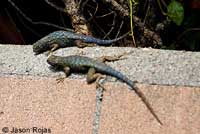 |
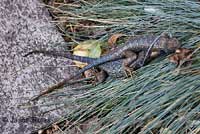 |
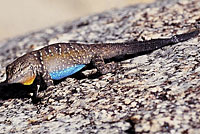 |
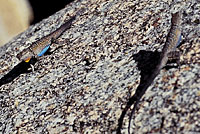 |
| Two adult male Great Basin Fence Lizards fighting. © Jason Rojas | Two adult male Small-scaled Lizards in combat, displaying their bright throat and ventral colors.These lizards were observed chasing and biting each other. Bite marks are visible on the tail of the lizard on the left. | ||
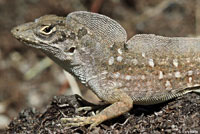 |
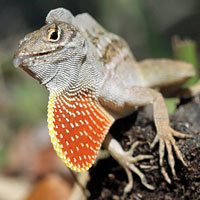 |
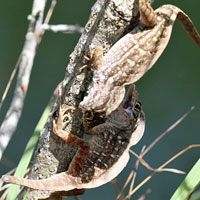 |
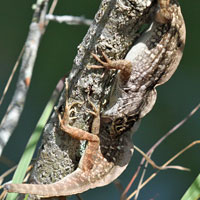 |
| Sometimes an anole's distended dewlap display warning does not work, as you can see with the Cuban Brown Anole shown in the left two pictures. Seeing another male nearby, he raised himself up and distended his dewlap, but the second male lizard attacked him anyway. They fought for a moment, which you can see in the pictures on the right, until the first male ran away. |
|||
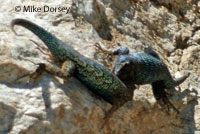 |
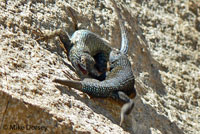 |
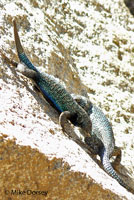 |
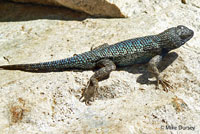 |
| Two male Great Basin Fence Lizards fighting over territory in May in the San Bernardino Mountains, San Bernardino County - The winner claims the rock © Mike Dorsey |
|||
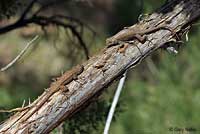 |
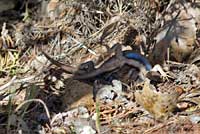 |
 |
 |
| A male Plateau Fence Lizard moves up the branch where another male is sitting (left). They begin fighting and leap about six feet to the ground (center). The loser runs away and the victor returns to his original location on the branch. The video on the right shows some of the fight after they hit the ground, and the victor after he returned to the branch and did some victory push-ups. |
Two adult males squared off and showing each other their colors and bodies in a territorial dispute in Lake County. © Kathleen Scavone | ||
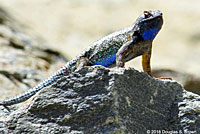 |
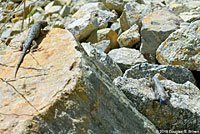 |
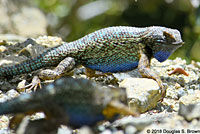 |
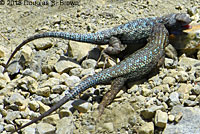 |
| Two adult male Great Basin Fence Lizards in spectacular breeding colors fight over territory in April in Los Angeles County. © Douglas S. Brown To see the full series of pictures of the battle, click here. |
|||
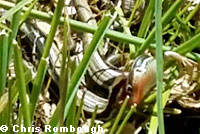 |
 |
||
| Two male Northwestern Skinks fight over territory during the breeding season on a day in early May in Skamania County, Washington. One bites the other on the head and cannot be shaken off. © Chris Rombough |
Two male Southern Sagebrush Lizards in combat © Jason Nichols | ||
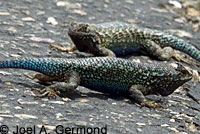 |
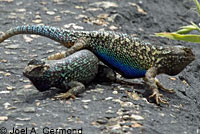 |
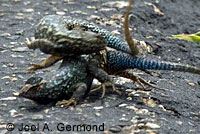 |
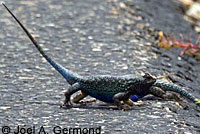 |
| Two colorful adult male Coast Range Fence Lizards fighting during the May breeding season, San Luis Obispo County. © Joel A. Germond | |||
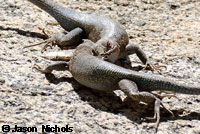 |
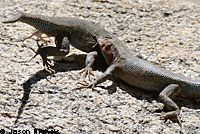 |
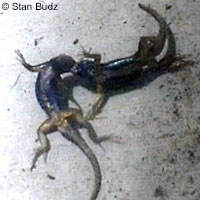 |
|
| Two male Southern Sagebrush Lizards in combat © Jason Nichols | This short video shows two male Great Basin Fence Lizards fighting over territory, biting on to each other's mouth. © Stan Budz | ||
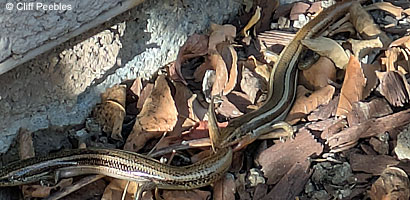 |
|||
| Two male Northwestern Skinks in the breeding season apparently fighting over a female hiding nearby. One skink is biting the tail of the other skink. © Cliff Peebles |
|||
Return to the Top
© 2000 -
